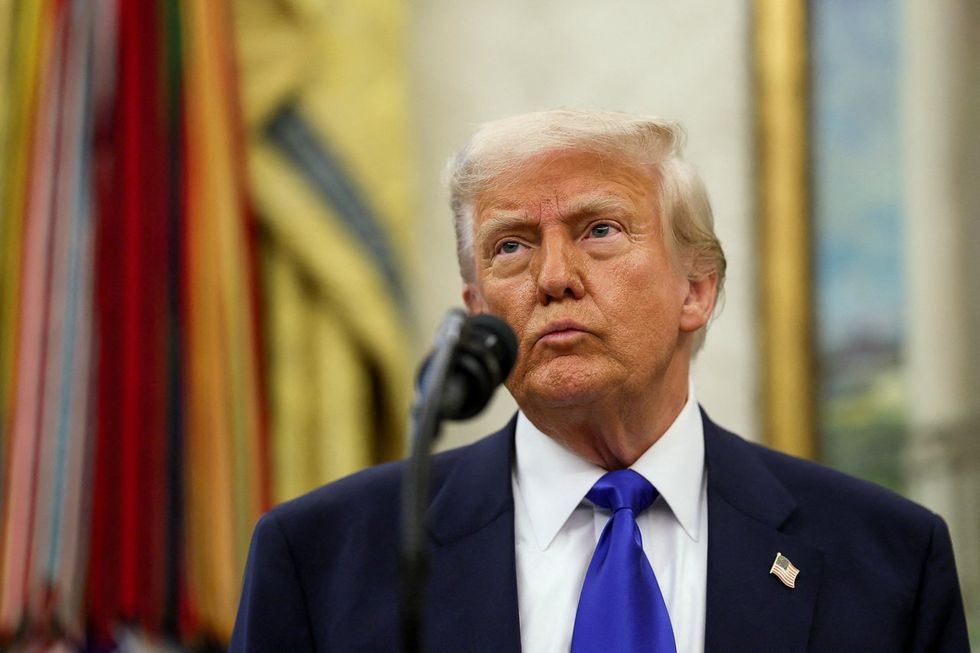Business
Trump Faces Criticism for Funding Decisions Amid Shutdown

President Donald Trump has come under scrutiny for his funding decisions during the ongoing federal government shutdown. On October 20, 2023, he announced via Truth Social that he is seeking clarification from the courts on how to legally fund the Supplemental Nutrition Assistance Program (SNAP) after a federal judge mandated that his administration continue to provide financial support for the program during the shutdown.
Critics, including the New York Times Editorial Board, argue that Trump has demonstrated a selective approach to funding throughout the shutdown. They note that he has successfully allocated funds to military personnel and FBI agents, redirected tariff revenues to families with young children, and even arranged financial support for Argentina. Furthermore, he has instructed the Department of the Interior to keep federal lands open for hunting. However, the editorial board highlights that Trump has chosen not to extend federal tax credits, which are crucial for millions of Americans in affording health insurance.
As the shutdown extends into its second month, over 40 million lower-income families face the threat of losing food assistance due to the Trump administration’s decision to halt the distribution of food stamps, opting not to utilize the program’s emergency reserve fund. The shutdown has had widespread repercussions, leaving more than 1 million federal workers unpaid and disrupting loans from the Small Business Administration. Additionally, routine safety inspections of food processing plants have largely ceased, raising concerns about public health.
The editorial board criticized Trump’s approach, stating that he and his congressional allies could resolve the situation by reaching a compromise. Under current Senate rules, the Republican Party does not possess enough votes to independently pass a funding bill, yet they continue to pressure Democrats to yield without negotiation. The board emphasized that effective governance in a democracy requires compromise rather than unilateral demands.
In a controversial move, Trump has reportedly suspended funding for projects in Democratic-controlled states, such as the vital Hudson River train tunnel between New Jersey and New York. Cuts to mass transit projects in cities like Chicago have also been targeted. The editorial board condemned Trump’s recent actions, including the suspension of food stamp distribution, calling it “unconscionable,” while he claims to oppose hunger among Americans.
The New York Times editors concluded that the Republican Party’s assertion of being the champion of the working class is undermined by the impact of their policies on working families. Many of these families rely on tax credits for health insurance and food assistance. They urged Trump to leverage his negotiating skills to address these needs, stating, “It’s time to make a deal.”
-

 World2 weeks ago
World2 weeks agoGlobal Air Forces Ranked by Annual Defense Budgets in 2025
-

 World2 weeks ago
World2 weeks agoMass Production of F-35 Fighter Jet Drives Down Costs
-

 Science2 weeks ago
Science2 weeks agoTime Crystals Revolutionize Quantum Computing Potential
-

 Top Stories2 weeks ago
Top Stories2 weeks agoNew ‘Star Trek: Voyager’ Game Demo Released, Players Test Limits
-

 Top Stories2 weeks ago
Top Stories2 weeks agoDirecTV to Launch AI-Driven Ads with User Likenesses in 2026
-

 World2 weeks ago
World2 weeks agoElectrification Challenges Demand Advanced Multiphysics Modeling
-

 Entertainment2 weeks ago
Entertainment2 weeks agoFreeport Art Gallery Transforms Waste into Creative Masterpieces
-

 Lifestyle2 weeks ago
Lifestyle2 weeks agoDiscover Reese Witherspoon’s Chic Dining Room Style for Under $25
-

 Health2 weeks ago
Health2 weeks agoGavin Newsom Critiques Trump’s Health and National Guard Plans
-

 Lifestyle2 weeks ago
Lifestyle2 weeks agoLia Thomas Honored with ‘Voice of Inspiration’ Award at Dodgers Event
-

 Entertainment2 weeks ago
Entertainment2 weeks agoFast & Furious Coaster Hits the Track at Universal Studios
-

 Science2 weeks ago
Science2 weeks agoWaning Crescent Moon: What to Expect on October 17









